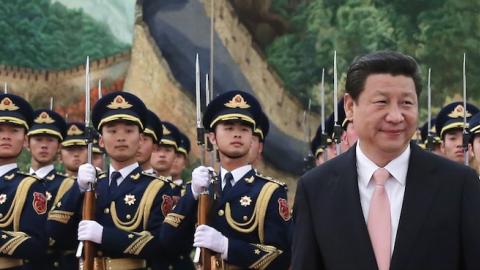The Chinese Communist Party's power has long rested on four pillars: economic growth, nationalism, repression and communist ideology. The last of these withered away almost entirely as China liberalized its economy, with slogans such as "Long live the invincible Marxism-Leninism theory" replaced by "To get rich is glorious." Now the first pillar is unstable too.
All eyes are on the gyrating Chinese stock market. Its precipitous decline and the surprise devaluation of the renminbi have been roiling world markets and stoking fears of currency wars and beggar-thy-neighbor trade policies. Given that only about 1% of our gross domestic product comes from trade with China, the U.S. economy is hardly at risk. Yet this summer's upheaval may accelerate developments that threaten the peace of Asia and pose a strategic challenge to the West.
China's economy has been slowing for a while. In this century's first decade, 10%-plus returns were the norm; lately the growth rate has hovered around 7% — if official figures are to be trusted, which they are not. The Chinese people have begun to feel the effects, and so has the government, with its reputation for sound economic stewardship declining in parallel with the downward-sloping GDP growth charts.
Xi Jinping came to power in 2012 determined to burnish the leadership's credentials in this all-critical area. His efforts have taken two forms. The first has been an anti-corruption campaign that plays to popular sentiments but has doubled as a vehicle for a purge of political opponents. Three years into the campaign, China's president has a large number of very bitter and well-placed enemies, whose family fortunes and lives are on the line.
At the same time, Xi has been searching for ways to reinvigorate China's economy. One measure he embraced was to talk up the stock market, which he promised the Chinese people would create both personal and national wealth. Almost right up to the initial tremors heralding this summer's crash, state-run news outlets were urging the population to buy stocks. As the Chinese market soared, this may have seemed to Xi's colleagues in the Politburo as a stroke of genius; millions of people were getting rich on paper, and the Communist Party was getting the credit for it. It now must appear to them — and to an entire class of unhappy investors — as a monumental act of maladministration.
Having lost ideological purity and economic stewardship as claims to power, the party is left, at least for the time being, with repression and nationalism.
Accordingly, Xi has cracked down on dissent with renewed vigor, sweeping up democracy advocates, environmentalists, lawyers, champions of minority group rights and anyone else who gets out of line. Simultaneously, he's intensified a campaign to bolster internal support by riling China's neighbors, particularly the hated Japanese. In the last three years, China has unilaterally declared an air-defense-identification zone over islands also claimed by Japan, deployed oil rigs off the coast of Vietnam and built an assortment of fortified artificial islands at strategic locations around the South China Sea.
These actions have created alarm in capitals across Asia, provoked military buildups and even encouraged regional cooperation in an effort to contain the increasingly menacing tiger.
China's bellicosity may ultimately prove self-defeating as a national security strategy. Indeed, Chinese conduct appears inexplicable without reference to its domestic sources. The costs of antagonism are evidently offset by the internal benefits for Xi and the party's grip on power.
Some observers perceive a silver lining in China's difficulties, believing that a country preoccupied with internal problems will be less aggressive and require fewer diplomatic, economic and military resources to hold it in check. That is wishful thinking rooted in a radical misreading of China's domestic political dynamics.
Prospects for conflict around China's periphery and beyond are likely to rise commensurately with the scope of the Communist Party's internal crisis. It is not an accident that this month China dared to send its navy into U.S. territorial waters next to Alaska, something it had never before attempted.
Even with the much-vaunted but underresourced "pivot" to Asia, the United States was ill-prepared to meet the challenge of preserving peace in the Pacific. Now the danger we face is growing steadily. The anxieties plaguing China's leaders, in place for decades, are fueling the belligerence of a rising power; the stock market fiasco, coming on the heels of an economic slowdown, has turned a scratch into gangrene.




















